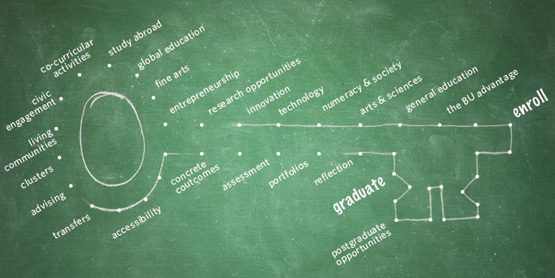A New Vision for Undergraduate Education
“One BU” aims to break down academic barriers

The key concepts of “One BU,” Boston University’s Strategic Plan, initiated in 2006 by President Robert A. Brown, include the central idea that, given its diverse schools and colleges, the University could build a competitive advantage by facilitating intermediate interactions among students and faculty in ways that enhance teaching, research, and service missions.
In 2008, University Provost David Campbell created a task force to examine how the One BU concept could be applied to redefine and improve the undergraduate educational experience. Led by Victor Coelho, associate provost for undergraduate education, the task force released its findings yesterday in a 42-page report called “One BU: Unlocking the Undergraduate Experience.”
According to Coelho, the report is a blueprint for expanding undergraduate opportunities by integrating activities and expanding opportunities for students across schools and programs.
“The University has an obligation to prepare students for lifelong learning,” he says. “A broad liberal arts education, combined with a solid background in a specific professional area, will allow students to pivot between careers and increase their options intellectually and vocationally.”
Comprising of deans, faculty members, administrators, and students, the 17-member committee emphasizes bridging the divide between BU’s liberal arts and professional schools. “We need to start looking at the University as a single entity,” Coelho says. “Education should be holistic.”
The report provides 60 recommendations for ways in which the University can enrich the undergraduate experience. The most logical place to start, he says, is by reducing barriers between schools and colleges.
“A recent New York Times poll indicates that nearly 16 percent of college graduates wish they had majored in something different,” he says. “But students hesitate switching because it’s so hard to do without falling behind and because the walls of colleges are not as porous as they might be.”
BU’s broad lineup of professional and liberal arts schools distinguishes it from smaller colleges, Campbell says. “We have schools for fine and liberal arts,” he says, “but we also have schools for journalism, business, and law.”
Campbell calls this the BU Advantage. “A 21st-century liberal arts education should provide a way to discover lifelong intellectual and vocational interests by offering a perspective on how knowledge is used and created in different fields,” he says.
Universities place too much emphasis on courses that relate only to a student’s major, according to Coelho. “The obsession to choose a major early on makes getting a liberal arts education all the more difficult,” he says.
The first step is for BU to determine what constitutes a general education. “There needs to be something that brands every BU student,” he adds, “something that makes the BU student unique.”
The plan suggests the addition of more introductory, “gateway,” courses, similar to those offered by the new University Honors College, which emphasize an interdisciplinary structure and collaborative research.
This would allow open dialogue between professional schools and the liberal arts and sciences, Campbell says. Students would continue to satisfy requirements for existing majors while taking advantage of an interdisciplinary structure.
Committee members also recommend grouping related courses from different schools into "clusters." For example, Coelho says, a student interested in the environment might take classes in environmental political activism, geology, and Henry David Thoreau. With more than 7,000 courses to choose from, it would be easy to create clusters around a strong theme. “The University of North Carolina at Chapel Hill, among many others, has had tremendous success with this concept,” he says.
The committee also proposes offering combined undergraduate and graduate degrees, increasing access to the arts, achieving greater global and technology competencies, expanding the School of Management entrepreneurship program to extend beyond the school, and offering science courses that address relationships between technology, public policy, and ethics. “The idea is to provide a more contextual base for the sciences at the general education level by making them relate more within society,” Coelho says.
The committee’s recommendations “are absolutely in step with the transformations that are taking place throughout the country, and very much part of the national conversation about undergraduate education,” he adds.
“We’re confident that the implementation of these suggestions will improve opportunities to make BU a more intellectually exciting place,” Campbell says. “Without sacrificing any educational rigor, we hope to offer a competitive advantage and enhance our ability to attract top-notch students.”
Vicky Waltz can be reached at vwaltz@bu.edu; follow her on Twitter at @vickywaltz.
Comments & Discussion
Boston University moderates comments to facilitate an informed, substantive, civil conversation. Abusive, profane, self-promotional, misleading, incoherent or off-topic comments will be rejected. Moderators are staffed during regular business hours (EST) and can only accept comments written in English. Statistics or facts must include a citation or a link to the citation.